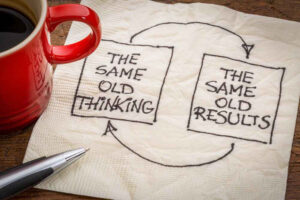Decades ago when I was still in school, I used to feel anxious and uncomfortable around large groups of people. As I grew older, the obligatory networking events I was told to attend to benefit my career were especially difficult for me and I often felt overwhelmed by the idea of meeting so many people at once, remembering their names and knowing the perfect thing to say. As my titles and responsibilities expanded, there was a frequent expectation to present to my team and other employees as well as occasional invitations to speak outside the company that filled me with dread. When I began writing books many years ago, the calls for public speaking increased exponentially and the talks were typically followed by obligatory social time with talk attendees and signing books. This only added to my stress and anxiety.
I struggled in silence for many years and worked as hard as I could to meet these expectations and not let anyone know of my challenges. I spent long hours in preparation, often practicing elaborate mental role playing to make sure I showed up well in group settings or developing long PowerPoint decks that covered every aspect of the topic I was speaking on to cover my presentation anxiety. I became an expert at how to make an appearance at networking events, say hello to a few key people and then quietly leave. In retrospect, I was not being true to myself in this effort to project a confidence I did not feel and meet the expectations others were placing on me. I assumed that this shortcoming…this “deficit” of mine, was something I would wrestle with for the rest of my life.
In my mid-30’s, I formed a friendship with an Industrial Psychologist who was doing work with my company. I confided to this insightful man about the challenges I was having and he had me take a battery of tests to gain more understanding about what I was facing. He helped me realize that I am, and likely always have been, a high functioning introvert. I truly enjoy engaging with others, but my energy for people fades as the day goes on and large groups of people can cause me to feel stressed and overwhelmed. He challenged me to turn this “deficit” of mine into a strength and find a more authentic path forward that better suited my personality. The light bulb came on for me as I began to stop seeing my challenges as a liability or burden, and began to look on them as minor obstacles that could be worked around or eliminated. The process of rethinking my deficit began at this critical stage of my career.
Here are five fundamental shifts I made that I still employ over 20 years later:
- Shifting from networking events to 1:1 coffee meetings and the occasional lunch. I am very sharp and energized early in the morning and I love getting to know people 1:1 over coffee or a meal. This fits my style perfectly and promotes a conversational approach focused on vulnerability and authenticity. The result? Over the last two decades I have met (and continue to meet) thousands of people over coffee/lunch and built solid relationships in a sustainable way that is much more effective than the stress-inducing cattle call of networking gatherings. This approach has also developed my active listening skills and passion for being curious, which are strengths I am grateful to use frequently in my daily life.
- Switching from only attending events to hosting events. Rather than enduring the stress of attending the events of others where I don’t know many people and am likely going to feel uncomfortable, I have learned to engage in different ways of meeting groups of people over the last 20 years. I host events with compelling guest speakers where I invite 75-100 leaders I know well from my business network or put together small-scale coffees or lunches with four or five people from my business and personal friend circles. These settings are much more comfortable for me and my guests have shared they find them very valuable.
- Shifting from decks to storytelling and facilitated Q&A. In my professional work, I often utilize presentation decks as I work with teams and large cohorts of leaders, but I make the sessions very interactive, utilize breakout sessions and share relevant stories rather than only read from text. When I am invited to give talks, I have largely scrapped the decks and share interesting stories from my life experiences and helpful ideas/tips the audience can utilize in their own lives. My favorite approach to speaking events is to have the person who extended the invitation to sit with me at the head of the room/event space and ask me questions on whatever topics they desire and for the audience to do the same. This evolution in my speaking approach fits my personality well and has made me a much more effective and compelling speaker.
- Becoming a writer. My Industrial Psychologist friend gave me a leather journal a few months into our friendship and encouraged me to start writing down my thoughts. He said I had a voice that needed to be heard and that focusing on writing as the medium to share that voice was a better fit for my personality than only doing speaking events. I was apprehensive, never having written a word for public consumption before, but I trusted his thoughtful advice and began to journal. 24 years later I have filled two dozen journals, authored 10 books and written hundreds of blog posts. I will be forever grateful to this wonderful friend who encouraged me to embrace what has become such a meaningful and enjoyable part of my life.
- Managing my energy better. I observed decades ago that I often felt flat and tired at the end of the workday. I learned, with my friend’s help and the testing I referenced, that I needed to find ways to “re-charge my battery” during the day to have adequate energy for myself and others. Here are the three changes I made that helped the most: 1) I get in 30 minutes (minimum) of exercise every day, typically over lunch if possible. 2) I schedule two 30-minute blocks of “air” on my calendar spread four hours apart where I don’t have any meetings. 3) I walk two-four miles at the end of every day just before dinner, weather permitting. These important breaks on my calendar help me stay more energized throughout the day and I am better able to give my clients, friends and family what they need from me.
You might think this post is about the struggles of a high functioning introvert, but you would be missing the key point. No matter what your perceived shortcomings or “deficits” may be, it is often possible to work around them, eliminate them or turn them into strengths. Think about areas you have been told to work on or have identified as challenges. There are certainly going to be some areas where you do need to improve and we should all embrace growth and personal development, take part in helpful training or seek mentors and coaches who can help us. But, perhaps some areas of your life that are causing stress, anxiety or worry simply require new thinking and a more authentic approach from you that better fits your needs and personal style.
After you read this post, I encourage you to make a list of any shortcomings or deficits you are wrestling with right now. Make a concerted effort to get help and development in the areas where you truly want to improve, but also examine where you might just need to change your mindset and rethink how you view your deficits. Shift your approach, embrace your authentic self and follow paths that may buck conventional wisdom and the chorus of opinions around you who simply want you to conform to the way everybody else does things. Seek the counsel of candid and wise people in your life who can help you in this effort. I know for a fact if I had not made the shift I did over 20 years ago with the help of a wise friend, I would not be doing the work I love today or having the countless opportunities I am blessed with to serve my clients, friends and the community. Think carefully about how this post speaks to you, be intentional about what changes you need to make and enjoy the rewards I am confident you will experience.
Good luck!






